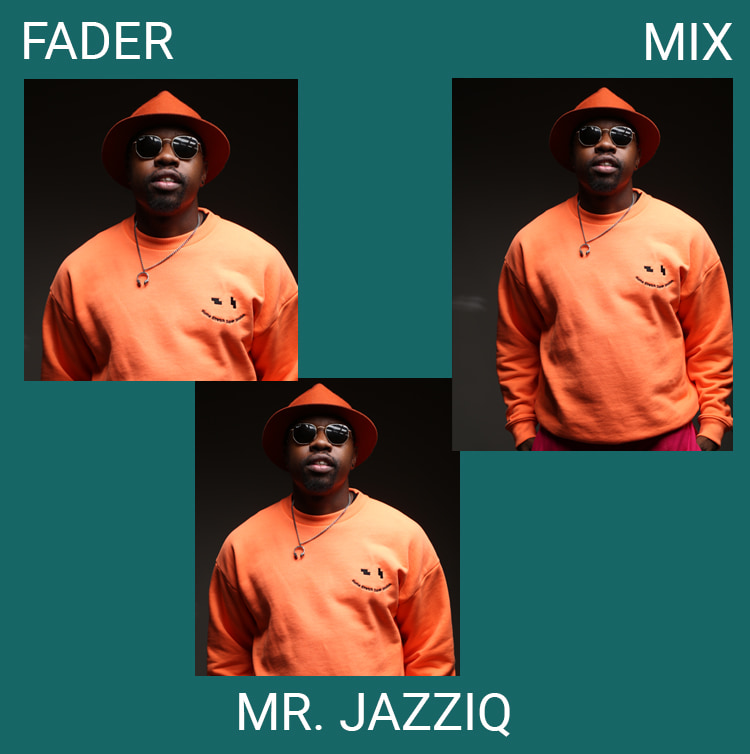
The longstanding FADER Mix series presents new, exclusive DJ mixes from our favorite artists and producers.
As one half of JazziDisciples, Johannesburg-based producer and DJ Mr. JazziQ is considered one of the pioneers of Amapiano, a blend of deep house, jazz, and kwaito, another South African dance genre that emerged in the 1990s. Slower and more subdued than the Afrobeats and Afropop sound of West Africa, Amapiano’s groove oscillates between laid back and mid-tempo, with booming basslines, plenty of synths, and soulful piano or flute melodies. Despite being around since 2012, it saw a spike in popularity in 2020. “It really blew up over the past couple of years here,” JazziQ explained. “The genre is growing and I want to take it to dancefloors everywhere.” For his FADER Mix, JazziQ blends the best of the genre, including established names and emerging talent in just under 37 minutes.
Listen below — and read on for a short Q&A with the producer.
Tracklist:
1. Mr Jazziq & Kabza de Small -Untitled
2. Mr Jazziq & Kabza De Small - Untitled
3. Mr JazziQ -PWTE ft Soul revolver & Mellow & Sleazy
4. Nutty Cyber - Middle East
5. Mr JazziQ - Woza ft Kabza De Small, Lady Du & Boohle
6. Kabza De Small & Mr JazziQ - Le Tin ft Reece Madlisa & Zuma
7. Mr JazziQ - Nomayini ft Boohle, Mellow & Sleazy
The FADER: How would you say Amapiano started to develop as a genre separate from South African House and kwaito?
Well, it's this combination of different South African sounds: Kwaito, deep house, jazz. There are chords, strong melodies, chants. Initially, we started with instrumentals and from there added more melodies, chords, and bouncy basslines. The next step was the chants which are also quite popular in house music. The real separation came when artists started doing some proper writing of lyrics on the beats we were making. That was about the point that it was clear-cut that this is a whole other genre that can stand on its own.
I think the things we sing about also set it apart from house, as [Amapiano] is so embedded in township culture up here in the North. Take for example Kabza and Maphorisa writing about Thembinkosi Lorch, one of the most popular soccer players from Johannesburg's Orlando Pirates. My track "Sithi Sithi" is local slang for "I am saying this, now I am saying that," which is a popular expression here. Another example is Musa Keys' track "Vula Mlolo" which talks about the negotiations here between the families of two people getting married. Everything is very rooted in our culture and that makes it very real, honest, and authentic.
Talk to me about your upcoming album, Party With The English.
The album has been a lot of fun to make. It was initially meant to be a 5 track EP but we ended up with the full album and even ended up dropping out some tracks. Some of it was during the hard lockdown we had over Christmas when we couldn't travel and do shows. The album has some great features from artists who are at the top of their game in representing the genre like Kabza da Small, Lady Du, and Boohle, but also newcomers — some of whom are going to be signed to my label Black is Brown.
Which track stands out in this mix for you?
“Woza” feat. Lady Du, Boohle and Kabza Da Small. This was the first single from my album! We dropped it a couple of weeks ago and people have connected so much with it. I got an awesome video today from a bunch of people dancing to the track on a crossing outside the White House in DC.
What are some of your favorite memories from the early days of Amapiano as a genre and where do you see it going next?
We started playing in taverns and bars to a community of a maximum of 80 people in my township of Alexandra in Johannesburg. Seeing people's love for this new sound is definitely my favorite memory. We were hustling those small shows and a big crowd was considered El Dorado Park in Soweto. At the time there were just a few of us: Kabza Da Small, Luu Ninelven, Gaba Cannal. Africans all over the continent are loving the genre but now we need to take it to the rest of the world and invite everyone to join the 'yanos' fever.
You can pre-order Party With The English here.